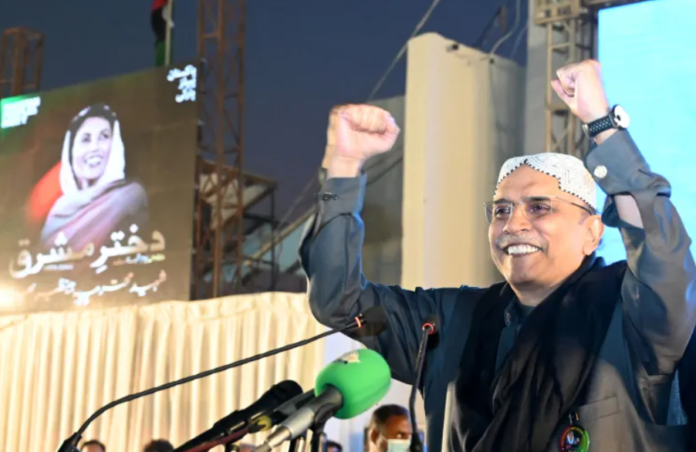Pakistan’s newly-elected President, Asif Ali Zardari, made a significant gesture towards financial prudence on Tuesday, announcing his decision to abstain from drawing any salary during his tenure. This move is part of his commitment to aid the cash-strapped country in facing its challenging economic conditions.
68 years old Zardari, assumed the role of Pakistan’s 14th President on Sunday and promptly conveyed his decision to waive his salary as a means to alleviate the burden on the national exchequer. His party, the Pakistan Peoples Party (PPP), issued a statement affirming his intention to promote responsible financial management and avoid further straining the country’s finances.
“The President deemed it imperative not to add to the financial burden on the national exchequer and opted to decline his salary,” stated the President Secretariat Press Wing in a press release on Tuesday.
Zardari, known as one of the wealthiest politicians in Pakistan, chose to forego this income.
Former president Arif Alvi had been drawing a monthly salary of Rs 8,46,550, a figure fixed by Parliament in 2018.
In a parallel demonstration of solidarity, Interior Minister Mohsin Naqvi followed Zardari’s lead by deciding to forgo his salary as well, citing the economic challenges confronting the nation. Speaking to X, Naqvi expressed his commitment to serving the nation during these trying times in every possible capacity.
“In these challenging times, committed to supporting and serving our nation in every possible way,” Naqvi conveyed in a statement on X.
Amidst Pakistan’s economic distress, marked by soaring commodity prices and pressing debt obligations, gestures like Zardari’s and Naqvi’s reflect an attempt to garner support from the public, particularly the financially strained masses. Similar initiatives have been undertaken previously, such as the Cabinet of former Prime Minister Shehbaz Sharif relinquishing their salaries and perks in February of last year to aid the country in managing its external liabilities.
Addressing his newly appointed Cabinet, Prime Minister Sharif underscored the urgent need to rein in inflation and stabilize food prices, identifying it as the foremost challenge for the government. Sharif emphasized the necessity for decisive action to navigate the economic crisis, urging his ministers to perform effectively.
Read more about politics.
Furthermore, Sharif directed the formation of a committee to address the pricing of essential food items, signaling a proactive approach to tackle economic challenges head-on. Additionally, the Cabinet approved restrictions on the export of onions and bananas until the 15th of the following month in response to recommendations from the Ministry of Commerce.
As Pakistan grapples with economic difficulties, Zardari’s and Naqvi’s actions symbolize a commitment to responsible governance and solidarity with the people amidst adversity.
Asif Ali Zardari, a prominent Pakistani politician and co-chairman of the Pakistan Peoples Party (PPP), has long been associated with politics and governance in the country. Son of Hakim Ali Zardari, got married to Ex. Prime Minister of Pakistan Benazir Bhutto in 1987, Known for his wealth and political acumen, Zardari has served in various capacities, including as the President of Pakistan from 2008 to 2013. His decision to forego his salary reflects his deep commitment to public service and financial responsibility amidst the economic hardships faced by the nation.



